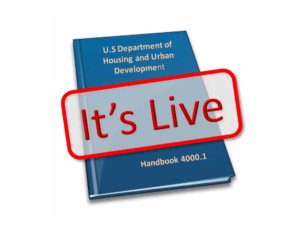 If you have been reading our LoanLogics Blogs and Newsletters as well as other industry publications, you are aware of the fact that the policies outlined in FHA’s 4000.1 Handbook (for the most part) became effective on September 14, 2015.
If you have been reading our LoanLogics Blogs and Newsletters as well as other industry publications, you are aware of the fact that the policies outlined in FHA’s 4000.1 Handbook (for the most part) became effective on September 14, 2015.
This 800+ page Handbook will provide a single reference point for FHA underwriting, Quality Control & appraisal policies. More importantly, if you are involved with the origination of FHA loans you need to be aware of the impact that many of the new policies (which just became effective) will have on prospective Borrowers, Appraisers, Underwriters, etc. Outlined below are just some examples:
Borrowers
- Any prospective borrowers that have student loans will find it more difficult to obtain an FHA loan. Now that deferred student loan debt must now be counted as a recurring obligation, it will impact the borrower’s back-end ratio.
- Borrowers that have loans secured by Timeshares will now have higher DTI ratios since FHA is now requiring such debts as installment loans which must be counted as a recurring obligation.
- Borrowers that receive non-taxable income (i.e. social security, railroad retirement, child support, etc.) will now only be able to “gross-up” this income by a maximum of 15% (previously it was 25%).
- FHA borrowers that are 60 years old and older will no longer be able to borrow the required funds to close for the purchase of a principal residence.
Appraisers
- FHA appraisal protocols now state that appraisers will be expected to operate all conveyed appliances (such as a dishwasher) and observe their performance. The Appraiser must notify the lender of any deficiency if an appliance is found to be inoperable.
- FHA Roster Appraisers will now be required to report on the sales history of the comparable properties for at least the past three years. Previously, only a one-year sales history was required. The one-year sales history requirement is standard for Fannie Mae, VA, Freddie Mac, etc.
- FHA Roster Appraisers will now have to indicate whether or not the subject property can be rebuilt if destroyed when the property has a legal, non-conforming zoning designation.
- FHA Roster Appraisers will now be required to test a property’s sump pump in order to determine if it is properly functioning.
Underwriters
- Direct Endorsement (DE) Underwriters will need to be cognizant of the credit policy changes that FHA has implemented – most of which signals a return to very conservative underwriting. Some examples are:
- source of funds documentation is needed for deposits of 1% or more of the sales price
- all documents cannot be more than 120 days old
- any undisclosed mortgage debt, or if business income declines by more than 20%, requires a downgrade to a manual underwrite
- if an hourly wage earner has his/her hours vary
- the DE Underwriter must average income for the past two years
- cash-out refi’s require the Borrower to occupy the property as their principal residence for the past 12 months
Lenders
- Lenders are now required to process pre-closing (or pre-funding) case reviews on 10% or less of their FHA QC monthly sample. Previously, pre-closing reviews were only recommended.
- Lenders must process appraisal re-assignments (at the Borrower’s request) within 5 business days.
[poll id=”65″]
It should be noted that the items referenced above are certainly not an all-encompassing list. I would highly recommend that anyone who is actively involved with origination, processing, underwriting or closing FHA loan transactions access the LoanLogics website which highlights the major FHA policy changes that are now effective.
